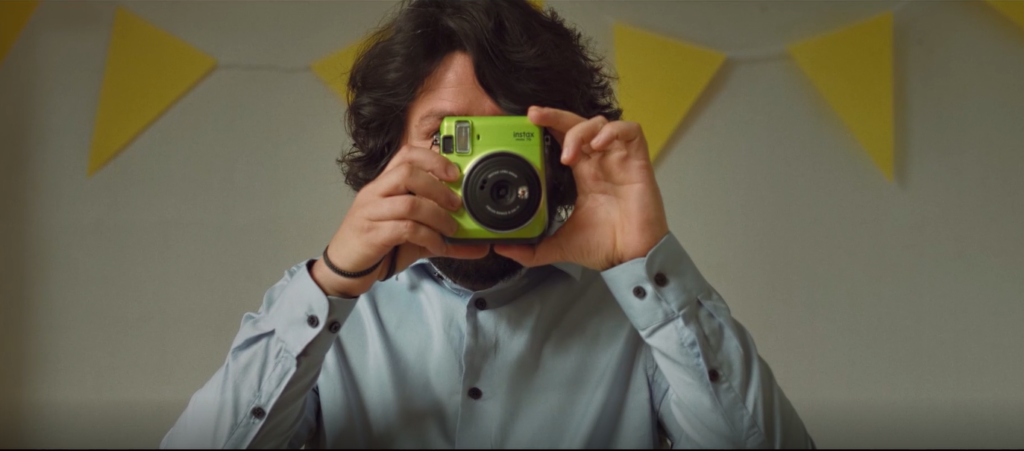A future film directors’ workshop led by Merab Kokochashvili brought together young people with interesting potential, in whose works we can read the attempt to see the spark, aesthetics, beauty, and even value in everyday, seemingly banal stories and spaces, which will make us think about the events around us and show us their meaning. It might as well give us a small piece of life advice.
Ilia Asitashvili's film "Preparation" offers just that – a delicate, aesthetic, somewhat humorous, and familiar observation of the problematic relationship between a father and his teenage son in a modern family.
Luka's (Sandro Tvaradze) birthday is approaching. Before the guests’ arrival, the parents take a photo with him in turns. With the mother (Ia Sukhitashvili), it goes easily, while for the father (Jano Izoria), the process of taking it is long and unsuccessful; the photos are unnatural and full of awkwardness, and the boy's face is far from satisfying. Finally, the mother leaves them for a while so that they can take a better photo themselves. This effort drags on during the photo session or while choosing a gift in a clothes shop too, which is saturated with more inconvenience, misunderstanding, and squabbling.
The relationship between father and son is always interesting. As difficult as it is, it is so sensitive and fastidious. Especially today, when alienation and the gap between generations is much deeper. There are also many family characteristic structures here – respect for his mother, who remains an authoritative person until the end, while his relationship with his father has long been oscillating between the figures of an older brother and an non-authoritative father: while Luka obeys his mother without a word in everything, any issue with his father turns into an argument.
The visual side harmoniously responds to the aesthetics of "the fourth hero" of the film, the Polaroid camera- apart from the pastel colors that we encounter here and there, the cameraman (Tengo Kasradze) does not offer us a traditional compositional description of the human body structure. Certain cut of the shot space and parameters by reducing the resolution is interesting, which seems to make us look into the camera itself and forces us to focus on the details and not on the figure in general due to the reduced scale-what color is the shirt, the selection of which caused another misunderstanding between the father and son, how the crumbs of bread were cleaned from the table, etc. This effective means quite successfully acts on a viewer’s attention. At the same time, such expansion of space serves to intensify the proximity or distance between the characters - even if the father and son are standing close in the panoramic space, the alienation between them is even more noticeable.

The position of the main character of the film still leans towards the father since the attempt to improve the relationship comes from him-not only does he try to advance the function of a reliable parent and overcome the threshold of embarrassment and mistrust, but he also turns the photo session into an expression of his authority (be it a temporary confiscation of the mobile phone, wearing the festive hat, or forcing to choose a good shirt). In spite of everything, his attempt is expressed more by asking for obedience and asserting dominance than by a friendly approach, thus he again loses the boy's trust.
The environment is also symbolic-a middle-class family can be seen decorated for the holidays, wall decorations and paper birthday hats are accompanied by assorted dishes of Georgian cuisine. "I feel myself like a first grader," Luka grumbles as his father aggressively wipes the soiled collar of his shirt, to which the latter replies that he thinks he's a first grader too because of the way he's acting and how displeased he is.
In the end, the father wins when he buys himself the shirt that Luka liked, although he did not admit it, and with a little psychological trick and indirect persuasion, he will get a good birthday present and take the desired photo, although unsuccessfully because the boy sneezes, but the most important thing is that the Rubicon of embarrassment and tension has been overcome.
The film manages to overcome the big problem that always stands in the way of acting skills, especially in student films. Firstly, duet of Jano Izoria and Sandro Tvaradze is worth mentioning, who naturally present the dynamic full of tension and awkwardness that comes from the boy's side (however, the necessary awkwardness does not reach the end and merges with the screen awkwardness). A relatively weak link is the character of the mother, who, at first glance, should be a mediator and conciliator between the father and son. She does, indeed, prepare the ground—leaving them alone to take the picture on their own, and then showing up when no consensus has yet been reached. Such a disappearance-return of hers seems unnecessary, because the focus is already on the restoration of the father-son relationship.
The film participated in several important film forums in 2022. It won the jury’s special prize at the Gaziantep (Turkey) International Student Film Festival, and the jury’s special mention at the Mestia (Georgia) International Short and Mountain Film Festival. The members of this jury described it as "an interesting, delicate, and aesthetic observation of modern family relations," which perfectly suits its significance.
Eter Parchukidze,
MA student in Film Studies






